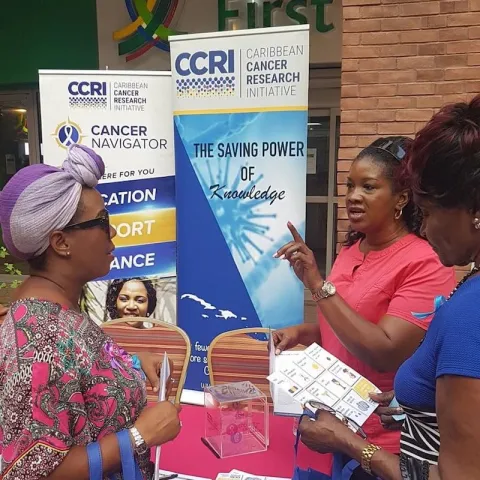Introducing patient navigation for metastatic breast cancer patients in the Caribbean

Context
Trinidad and Tobago have one of the highest breast cancer mortality rates in the Caribbean and the highest breast cancer mortality ratio in the Americas.[1] Many factors can explain these disparities, including shortfalls in health services and pervasive cultural myths and taboos that can impede conventional therapy. To address the pressing need for metastatic breast cancer (MBC) patients to access timely information and treatment, the Caribbean Cancer Research Initiative (CCRI) has launched the first patient navigation programme in the region.

CCRI is a not-for-profit organisation established as a result of a realisation of how little the Caribbean region knew about cancer in its population and how much needs to be done to alleviate the cancer burden. The organisation is composed of researchers, physicians, oncologists and health advocates bridging the gap between research, medicine and the patient experience.
In 2017, CCRI was one of twenty organisations selected to receive a SPARC grant, with their objective of their project to introduce a patient navigation programme for MBC patients in the region to help them to understand their diagnosis and equip them as they handle the logistical, financial and emotional hurdles that come with the disease.
Project description

One of the first project activities was to assess patient navigation needs in Trinidad and Tobago through patient focus groups. A number of gaps were identified including; patients’ understanding of the diagnosis and treatment options, what they could expect in the months following a diagnosis, as well as how to access emotional, psychological, financial and logistical support.
Based on these findings, CCRI designed a training programme and curriculum for patient navigators. In August 2018, they held the first five-day patient navigation training course in which 28 health professionals were trained. Attendees came from Trinidad and Tobago, Jamaica, St Lucia, and Antigua. The core competencies and learning objectives of this training addressed the limitations to access cancer care in Caribbean territories.
In November 2018, CCRI launched the cancer navigator programme, which is a one-to-one support service for patients. The navigators enrol the patients and offer them guidance on any issues they raise. The programme complements the health care system as it fills the gap in patient support and increases patient adherence to treatment. Additionally, CCRI set-up a referral pathway to their navigation programme within public oncology units in Trinidad and Tobago and uses an electronic medical record system that allows them to track all encounters with patients.
Impact

This project has had a significant impact on MBC patients in the country, of which an estimated 75% now have access to patient navigation, as a result of the CCRI programme. In the first year of the project, 58 patients were enrolled in the cancer navigator programme, and the number is increasing as more hospitals are adopting the navigation programme.
Through the support of additional funders, the work accomplished through the SPARC grant has reached patients with other types of cancer, such as pancreatic cancer, and now, they too can access these services for free in Trinidad and Tobago. CCRI will continue expanding these services in order to reach the highest number of cancer patients possible.
CCRI continues to build local and regional capacity through its patient navigation programme and is specifically looking at expanding to St Lucia and Guyana. Currently, they are developing their own e-campus to facilitate continuous training, supported by a SPARC top-up grant. In the future, this platform will support continuing medical education for nurses and physicians.
More
- Organisation's website: Caribbean Cancer Research Initiative (CCRI)
- Webpage: Patient navigation programme for patients
- Webpage: Patient navigation training programme
- Video: "About CCRI's Cancer Navigator Programme"
- Training manual: "Cancer Patient Navigation Training Programme"
- Journal Article on this project: Badal K, Marcellin E, Tam Ashing K. “Development of a Cancer Patient Navigation Training Program for the Caribbean Context”. Journal of Oncology and navigation survivorship, July 2019 Vol 10, No 7.
References
[1] GLOBOCAN, 2019
(Information from the project description and context is compiled from the SPARC reports)
Last update
Friday 03 February 2023